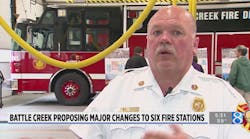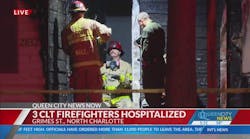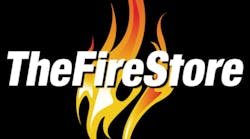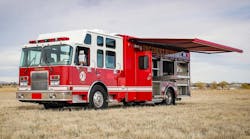We thank Contributing Editors William Goldfeder and Mark McLees for helping compile these reports. We again invite readers to share their experiences. You may send them to Chief Goldfeder at [email protected].
POOR STAFFING + NUMEROUS IMMEDIATE TASKS = MAJOR DANGER!
Our volunteer/call department has five engines, one ladder company and one heavy rescue company. Our daytime staffing is very low because most of our firefighters work out of town. There are only about six of us in town during the day, so we rely heavily on mutual aid.
The call came in at about 8:30 A.M. for a fire in a single-family dwelling. Our chief arrived on the scene and transmitted a working fire in a 21/2-story wood-frame dwelling with occupants inside. The first-due engine was from my station and had three of us on it. The fire was about a quarter-mile away from the firehouse.
When we arrived on scene, the incident commander ordered us to attack the fire and search for occupants, as one male was reported to be in the building. The fire was on the first floor and the entire building was heavily charged with smoke. A police officer told me the victim was in the kitchen, so one other available firefighter and I went in with an 13/4-inch line.
We searched the kitchen and it was empty. The fire was in the next room, so we started to knock it down. I left the line (and my partner) to take out a window. When I was taking it out, I saw a person standing outside the window, who turned out to be the victim's sister. She screamed, "My brother's upstairs ... can you help him?" The fire was being knocked down by now, so I told command that the person was upstairs and I was going to try for him.
At this time, the second-due engine company was just arriving on scene. I foolishly left the line and without a search rope went to the second floor by myself to search for the victim. Conditions were worse there. I began a search by myself, starting in the rear. I don't know how long I was up there, but suddenly my low-air alarm went off. This house was a maze, and I was nervous. I started to backtrack to get out, but I was totally disoriented. I crawled into closets that I didn't remember searching. I was lost and running out of air. Then, without another warning, my air was exhausted.
I ripped off my mask and noticed a lighter-color smoke to my left. It was a window about one foot wide. I sprinted toward that opening, smashed it out, leaned out as far as I could and screamed to the nearest firefighter, "I need help!" He rolled a ground ladder to me and I bailed out, head first, right down the ladder. I had smoke inhalation and cuts on my hand. The occupant was found shortly thereafter by other firefighters. He didn't make it.
I realize I made a lot of dangerous and irresponsible mistakes at this call:
- I left the hoseline.
- I began a search above the fire floor by myself.
- I didn't keep track of my air.
- I left the nozzleman by himself.
Now, I try to hammer into my people these dumb things that I did so they won't repeat them. I also can tell you that I'm much more cautious than I used to be.
Chief William Goldfeder adds the following comments:
When we read the above "Close Call," it seems so familiar, as this could happen to many firefighters in many, many communities. First, let's take a look at the numerous lessons learned:
1. He abandoned his partner. Yes, if a victim is clearly visible or heard screaming nearby, you may have to make a "quick grab," but in this case one team should have been assigned to search.
What's the lesson here? Sure, the firefighter should have stayed with his partner, but the real lesson is that one crew cannot do it all. You'll note that when the first crew arrived, the order was to "attack the fire and search for victims." Those are two clearly different tasks that must be done by two separate crews.
No firefighter should abandon his or her partner. Again, rarely should this happen; never say never. If there are two of you on a line and you hear or see someone nearby, you may need to travel a few feet away while your partner protects you with the line. That is a clear opportunity to rescue a victim. In this case, however, the victim was "somewhere" in the house. A systematic search must be done, and that requires adequate staffing.
2. Searching alone. At times, this may be required based on conditions, most notably when there is a clear chance to successfully make "the grab." In this case, a second crew should have been assigned to search for the victim, but due to poor response and staffing that could not immediately be accomplished.
3. Keeping track of your air. This one is simple - the alarm goes off, you and your crew get out and obtain new bottles.
In my opinion, the real lessons learned at this incident need to be at the command and fire administration level. These firefighters were being asked to do numerous tasks with dangerously inadequate staffing.
At all house fires there are numerous immediate tasks that absolutely must be done. Keep in mind, these are absolute minimums responding on the first alarm, based on verbal reports of a house fire. When arriving on the scene with smoke showing or a working fire, the first-arriving unit, following a size-up, must strike additional alarms to double or even triple these staffing numbers depending on conditions:
- One firefighter on the hydrant.
- One firefighter on the pump panel.
- Three firefighters on the initial attack line.
- Two firefighters for initial search.
- Two firefighters to ventilate.
- Three firefighters on the backup line.
- Three firefighters for relief/rescue.
- One commander.
- One secondary commander
- One interior commander.
These are the very basic, minimal amount of firefighters required on any initially reported dwelling fire.
What matters is that the basic tasks of water supply, stretching the first hoseline, stretching the second hoseline, vent crew (inside and outside), truck work, search and rescue all must be done at the same time, coordinated by an experienced, skilled and trained fire chief on the scene, with adequate staffing to do them.
Any fire department can do these tasks one or two at a time, but to do them successfully and minimize the chances of anyone getting hurt they must be done at the same time - and that takes plenty of firefighters.
Sometimes, we find ourselves in situations where, no matter what, we're still going to be placed "at risk," but in the above "Close Call," if the staffing was adequate, the search would have been going on at the same time as venting and the initial line being stretched. But because the staffing was inadequate, the above firefighter took some dangerous and unnecessary risks - and almost lost his life. Perhaps, if the staffing was adequate, the victim may have been rescued and a life saved.
The chief of this (and every) fire department is responsible for determining risks through an initial size-up, and then continuing to do that during the fire. Resources must be on the scene when needed, not 10 minutes after the determination of need is made. You must have plenty of staffing get the tasks done. Every one of the tasks is clearly measurable and justifiable. The tasks can change based on what kind of building is on fire, the occupancy, protection systems, size, construction, height, etc., so then, why, in most cases, don't our responses and strategies change in proportion to the increased amount of potential challenge? Why are we so afraid to have heavy responses to potentially heavy problems?
Just recently, I heard on my radio a nearby fire department respond to a house fire. The responding deputy chief called for one engine to respond on mutual aid. A question was then asked, "Do you want their ladder truck as well?" His comment was, "No, hold them in quarters. Let me wait until I get there and I will let you know if I need it." He arrived on the scene, found a working fire and within eight minutes was yelling for that neighboring department to "get your ladder truck out here immediately."
How does "waiting until it is needed" help anyone, from the occupants to the firefighters? It is a waste of time and can cost someone's life. What does it hurt to have the additional companies responding in case they are needed? They can always be sent home when it is clear that the help is not needed.
In a career fire department, if you know the staffing is inadequate for this scenario, immediate action must be taken to resolve the problem. That can include more staffing or automatic mutual aid on the first alarm. Accepting "low staffing" is not a solution to the problem.
In a volunteer or call fire department, you can predict when your staffing and responses will be low. Take action immediately to insure adequate first-alarm staffing through automatic mutual aid on reported building fires. You know when your staffing is low. Do something about it.
We may get hurt or even lose the life of one of our own in the provision of our duties; the key is do everything you can before the run to insure the public, your firefighters and yourself that you have done your best to be ready. Beware of those in our business who want to "risk manage" firefighting to the point where we have completely lost touch with our mission: to save lives, including our own. Adequate staffing for a full first-alarm assignment is one way to "manage the risk," assuring that everyone goes home safely after the run.





